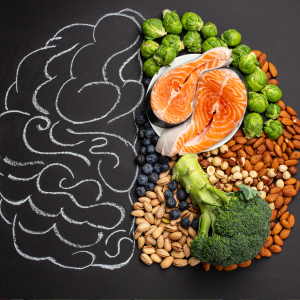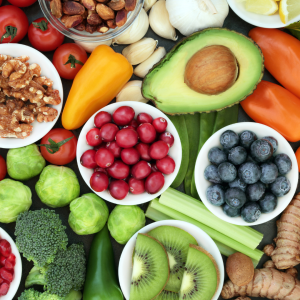Anxiety and depression are getting increasingly common and more and more people are affected by it. It is interesting that with all the advances that have been made in Western medicine, the cause of these issues remains very unclear. There is often talk about a lack of certain chemicals in the brain, a so-called “chemical imbalance”. This poses a question though; why is the brain lacking these chemicals? What could be the underlying cause of this imbalance?
The main approaches of treatment are medication and talk therapy however more often than not these interventions only help to a degree and most people are still left with, sometimes quite debilitating, symptoms. So it is time to dig a bit deeper.
In the last decade or so there have been plenty of interesting studies into the causes of mental health issues like anxiety and depression with some exciting results. I will delve a bit deeper into 2 of these theories: the Gut-Brain connection and the Brain Energy theory.
The Gut Brain Connection
 A lot has been written lately about the Gut-Brain connection. In her book “This is Your Brain on Food”, Uma Naidoo highlights how the health of our gut influences our mood and mental state. The gut is often referred to as the “second brain” and this is due its extensive network of neurons. These neurons in the gut produce neurotransmitters like serotonin, which are crucial for mood regulation.
A lot has been written lately about the Gut-Brain connection. In her book “This is Your Brain on Food”, Uma Naidoo highlights how the health of our gut influences our mood and mental state. The gut is often referred to as the “second brain” and this is due its extensive network of neurons. These neurons in the gut produce neurotransmitters like serotonin, which are crucial for mood regulation.
She’s also looked at the gut microbiome. This refers to the trillions of microorganisms that live in the digestive tract, particularly the intestines. These microorganisms play a crucial role in various bodily functions, including mood regulation and mental health. A healthy microbiome can help reduce inflammation and support the production of mood-stabilising chemicals.
The Brain Energy Theory
The Brain Energy theory as proposed by Dr Christopher Palmer, suggests that mental health disorders such as depression and anxiety can be understood as metabolic disorders. According to this theory, the energy production within the brain’s cells is impaired. When the brain’s energy supply is disrupted, it can lead to symptoms affecting mood, cognition and behaviour. By focusing on improving the energy production and the brain energy metabolism one can address mental health conditions. This metabolism improvement can be done by changes to your diet.
Brain Food for Anxiety and Depression
Both these theories stress the importance of the gut and metabolism. They both show that with improved gut health we can have a better outcome for our mental health. Improving gut health is something we can all achieve by making changes to our diet.
Some of the foods that can boost mental health according to research are:

- Leafy Greens: They are rich in folate which is essential for the production of neurotransmitters like serotonin and dopamine, the feel good hormones.
- Omega-3 Fatty Acids: These are known to reduce inflammation and support brain health and particularly beneficial for those experiencing depression. They are found in fatty fish like salmon, mackerel and sardines.
- Pre and Probiotics: Foods like yoghurt, kimchi and sauerkraut are rich in probiotics which can help maintain a healthy gut microbiome. Prebiotics are found in oats, bananas, garlic, onions and leek. They can balance the gut and improve mood and anxiety symptoms.
- Healthy Fats: olive oil, nuts and avocados.
- Berries: Berries are packed with anti-oxidants and vitamin C. These can help reduce oxidative stress and inflammation in the gut and the brain.
- Nuts and Seeds: Almonds, walnuts, flaxseeds and chia seeds are excellent sources of magnesium, a mineral that plays a key role in brain function and mood regulation.
- Whole Grains: Whole grains like oats, brown rice and quinoa provided a steady release of energy and contain essential nutrients like B vitamins, which are important for gut and brain health.
- Spices: saffron and turmeric.
- Herbs: oregano, lavender, passionflower and chamomile.
It is always best to get the right nutrients by eating high quality foods however it is also an option to use supplements to take in the essential nutrients.
Foods to Avoid
It’s not only about the foods we can add to our diet. There are also certain foods that are detrimental to our brain health and best to avoid. The main foods to avoid are:

- Processed Foods: Processed foods are generally high in refined sugars and unhealthy fats. Consuming these can lead to inflammation in the gut and brain and worsen our mental health.
- Refined Sugar: Baked goods, sweets, soda or anything sweetened with sugar or high-fructose corn syrup.
- Fried Foods: Anything deep fried in oil.
- Caffeine and Alcohol: Moderate consumption of these might be fine for some however it is all about not overdoing it. Excessive consumption can lead to an increase in anxiety levels and disrupt sleep patterns which is detrimental to our mental health.
- Nitrates: This is an additive used in bacon, salami, sausage and other cured meats.
- Artificial Sweeteners: These can interfere with neurotransmitter function and can negatively impact mood and anxiety.
- Bad Fats: Trans-fats such as in margarine and hydrogenated oils.
Additional Support for Anxiety and Depression
By making mindful food choices and understanding the impact the gut and metabolism have on brain function, we can take significant steps towards better mental health. Diet alone however is not a cure-all but it can be a powerful tool in conjunction with other treatments.
As mentioned before, medication and talk therapy definitely have their place and can be helpful in many cases. At Natural Solutions Acupuncture, we aim to benefit the gut and reduce the inflammation in the body and brain by using acupuncture and herbal medicine. We are also able to support you when you’re making dietary changes.
If you’d like us to support you with your mental health, you can make an appointment here.
This blog was written by Marieke O’Halloran

